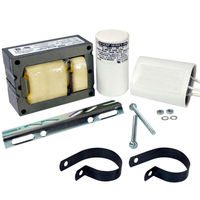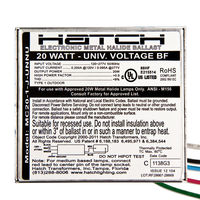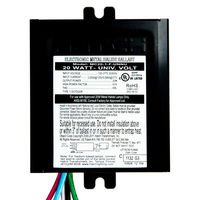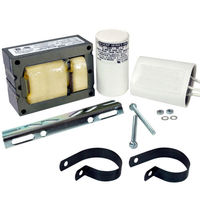Pulse Start | Metal Halide Ballasts | HID
Sola E-MCA00W200 - 200 Watt - Pulse Start - Metal Halide Ballast
ANSI M136 - 4 Tap - Power Factor 90% - Max. Temp. Rating 212 Deg. F - Includes Dry Capacitor, Ignitor, and Bracket Kit
- ANSI Code: M136
- Wattage: 200 Watt
- Voltage: 120, 208, 240, 277
- Ballast Type: CWA
- Operates: MH200/PS
- Start Method: Pulse Start
- Warranty: 3-Year Limited


Hatch MC20-1-J-UNNU - 20 Watt - Electronic Metal Halide Ballast
ANSI M156 - 120/277 Volt - Power Factor 95% - Max. Temp. Rating 176 Deg. F - Bottom Feed With Studs
- ANSI Code: M156
- Family: Mini
- Voltage: 120
- Ballast Type: Electronic
- Operates: MH20/PS
- Power Factor: 95%
- Start Method: Pulse Start
- Length: 3.45 in.
- Height: 1.27 in.
- Width: 3.13 in.
- Warranty: 5-Year Limited


Hatch MC20-1-F-UNNU - 20 Watt - Electronic Metal Halide Ballast
ANSI M156 - 120/277 Volt - Power Factor 95% - Max. Temp. Rating 176 Deg. F - Side Leads with Mounting Feet
- ANSI Code: M156
- Family: Mini
- Voltage: 120
- Ballast Type: Electronic
- Operates: MH20/PS
- Power Factor: 95%
- Start Method: Pulse Start
- Length: 4.04 in.
- Height: 1.21 in.
- Width: 2.96 in.
- Warranty: 5-Year Limited


Sola E-MCA00W1001 - 1000 Watt - Pulse Start - Metal Halide Ballast
ANSI M141 - 4 Tap - Power Factor 90% - Max. Temp. Rating 212 Deg. F - Includes Dry Capacitor, Ignitor, and Bracket Kit
- ANSI Code: M141
- Wattage: 1,000 Watt
- Voltage: 120, 208, 240
- Ballast Type: CWA
- Operates: MH 1000W
- Start Method: Pulse Start
- Warranty: 3-Year Limited

Understanding Pulse Start Ballast Technology
Pulse start ballasts offer significant advantages over traditional probe start systems. These advanced ballasts utilize higher starting voltages to power metal halide lamps, resulting in superior illumination, extended lamp life, and enhanced energy efficiency. Whether you're upgrading existing lighting systems or designing new installations, pulse start ballasts deliver exceptional performance for commercial, industrial, and institutional applications.
Types of Pulse Start Metal Halide Ballasts
When selecting a pulse start metal halide ballast for your lighting needs, several options are available to accommodate different installation requirements. Core and coil pulse start ballasts remain the most widely used in industrial environments such as warehouses, factories, and gymnasiums due to their durability and heat resistance. F-can models provide an excellent alternative for indoor applications where noise reduction and compact size are priorities, making them ideal for offices and retail spaces. For maximum efficiency and performance, electronic pulse start ballasts deliver unmatched power regulation, reduced weight, and superior lumen maintenance compared to their magnetic counterparts. Each variant offers specific benefits that should be considered alongside your unique lighting requirements.
Selecting the Right Pulse Start Ballast for Your Application
Choosing the appropriate pulse start metal halide ballast requires careful consideration of several factors. First, determine the wattage requirements of your lamps, as pulse start ballasts are available in a wide range of watts. Next, confirm compatibility with your power supply's voltage and whether you need a multi-tap ballast for flexibility. Consider the installation environment—will the ballast operate in high-temperature conditions or require noise reduction features?
For outdoor applications, look for ballasts with robust thermal protection and weather-resistant housings. When retrofitting existing systems, ensure the new pulse start ballast is compatible with your fixture's form factor or select an appropriately sized ballast box to house components. For optimal performance and longevity, pair your pulse start ballast with capacitors designed for high-intensity discharge lighting and appropriate ignitors that deliver the proper voltage pulse for lamp starting.
By understanding the features, benefits, and selection criteria for pulse start ballasts, you can make informed decisions that enhance lighting performance while reducing energy consumption and maintenance requirements for years to come.




